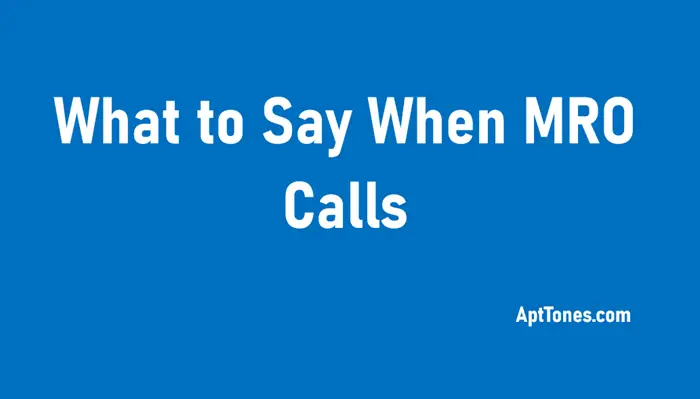MRO professionals deal with complex technical problems every day. When they call, they need clear answers and reliable information to keep operations running smoothly.
Good communication with MRO teams can save time, prevent costly mistakes, and build strong working relationships. The right response shows you understand their urgency and technical needs.
Here are 20 practical ways to handle MRO calls effectively. These responses will help you provide the information they need while maintaining a professional connection.

20 Things to Say When MRO Calls
Each response is tailored to different scenarios, highlighting the importance of context, tone, and content in effective communication.
Response 1: Confirming Receipt of Information
“Thank you for the update. I’ve noted the details and will ensure the necessary actions are taken. Could you please confirm the timeline for the next steps?”
This response is appropriate when acknowledging information received from the MRO professional. It shows attentiveness and initiative by asking for a follow-up timeline, which is crucial in maintaining workflow and deadlines.
Response 2: Seeking Clarification
“I appreciate your detailed explanation. However, for clarity, could you please elaborate on the specific technical aspects of the repair process you mentioned?”
Use this when you need further details on technical aspects. It demonstrates a willingness to understand fully and ensures that all parties are on the same page, which is vital for complex MRO tasks.
Response 3: Expressing Concerns
“I understand the proposed approach, but I have some concerns regarding the potential impact on our operational efficiency. Could we explore alternative solutions that might mitigate these risks?”
Appropriate when you have reservations about the proposed solution. This response shows you are engaged and proactive in finding the best solution while maintaining respect for the MRO professional’s expertise.
Response 4: Providing Feedback
“I wanted to provide feedback on the service we received last week. The professionalism and efficiency of your team were impressive, and it significantly reduced our downtime.”
Ideal for post-service feedback. It’s important to acknowledge good work and communicate positive experiences, as this helps build a positive relationship and encourages continued high standards.
Response 5: Requesting Assistance
“We’re currently facing an issue with our equipment. Could you guide us through the troubleshooting process, or should we schedule a service visit?”
Use when immediate assistance is required. This response shows urgency and a clear request for guidance, essential in emergency or critical situations.
Response 6: Discussing Budget Constraints
“While I understand the necessity of the repairs, we are currently facing some budget constraints. Can we discuss possible cost-effective alternatives or phased implementation?”
This is suitable when budget limitations affect decision-making. It communicates financial concerns clearly, opening a dialogue for feasible solutions within financial boundaries.
Response 7: Scheduling Appointments
“We would like to schedule a maintenance check. What dates are available, and how long would the process take? We need to plan accordingly to minimize operational disruptions.”
Ideal for arranging future maintenance. It shows foresight and a desire to minimize impact on operations, indicating good planning and organizational skills.
Response 8: Updating on Progress
“I wanted to update you on the status of the project. We’ve completed the initial stages and are on track for the next phase. Are there any specific requirements we should be aware of moving forward?”
Use when providing updates. It shows you are on top of the project and seeking any additional input that might be necessary for future stages.
Response 9: Handling Misunderstandings
“There seems to be a misunderstanding regarding the scope of work. Could we revisit the initial agreement to ensure we have a mutual understanding and align our expectations?”
Appropriate in situations of miscommunication or confusion. It seeks to realign both parties’ understanding without assigning blame, focusing on resolution.
Response 10: Requesting Documentation
“Could you please provide the documentation related to the recent repairs? It’s important for our records and for ensuring compliance with our internal policies.”
Useful when needing to maintain records. It underscores the importance of documentation for procedural and compliance reasons.